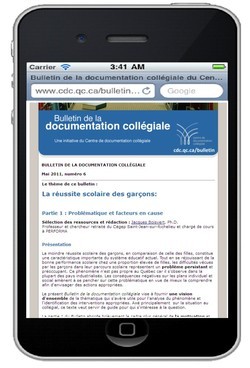A Librarian’s Tips for Staying at the Leading Edge of Techno-Pedagogical Developments
Whether updating your knowledge in the discipline you teach or monitoring technopedagogical trends, consider two questions: “Where” – Where does one look and what criteria does one use? and “How” – How does one handle this amount of information?
This article aims to provide tips to help you answer these questions and to transform this task into a customizable and automated monitoring process allowing you to remain informed of the latest developments and publications in your field or in your interests.
How to Remain at the Leading Edge
Here is a list of resources or tools, from simple to more complex (Rafael Scapin, Dawson College’s IT Rep has prepared a fascinating PowerPoint Presentaion explaining his sources of information for lisitings in the college’s weekly IT update called DawsonITE), to leave you in control of your information research. You are, indeed, the best person to evaluate, sort and reuse the results of your research!
Visiting or Subscribing (Web 1.0)
Rather than visiting regular Web sites or blogs on topics that interest you, why not subscribe to their newsletter, mailing list or even use a monitoring tool like Watch That Page? You can create keyword alerts for your research in a number of search engines including Google and even some bibliographic databases. Not sure how to do this? Ask your librarian!
Actively Participating (Web 2.0)
Social media are fabulous ways to plug into new products and innovations. Follow ongoing developments in Michelle’s Emerging Media Blog. REPTIC Michel Vincent, has written a great portrait of social media in French with a definite Quebec slant in Portrait des médias sociaux in CLIC. It is also possible to learn more about Twitter by visiting the most recent document published in Profweb Pedagogical Applications of Twitter written by Séverine Parent and Michelle Deschênes.
Sharing Your Discoveries (Web 2.0)
Discoveries are meant to be shared! Use web bookmarks (Delicious, Diigo), or sites for sharing videos and photos (Picasa, Flickr, The World of Images), as well as PowerPoint slides and other documents. You can even become “editor” of your own synthesis using tools that automate web publishing called aggregators such as Scoop.it and Netvibes.
Another tip: check out the archives of a listserv, a forum or blog to identify information that suits your needs.

College Documentation Bulletin – Subscription and Archives
Essential Sources of Information for the Quebec College Network
Visit Profweb! This portal disseminates information from associations and organizations with the goal of integrating ICT into college teaching. You can also subscribe to Profweb’s weekly email newsletter called ProfwebExpresso or friend it on Facebook.
For specific information on certain topics or to access a particular service, consult the websites, newsletters and social networking sites of Profweb’s IT partners.
The CDC (Centre de documentation collégiale) is an example of an IT partner that produces a number of resources to enable teachers to stay informed. It publishes an academic newsletter that frequently deals with technological issues around 4 to 6 times per year. You can also follow the CDC team @collegial in their Twitter account or on their Facebook page.
Among other pertinent sources of information for college teachers are the following:
- The AQPC (Association québécoise de pédagogie collégiale) publishes a magazine for its members whose online edition frequently contains original English articles as well as translations of articles that have appeared in French in their hard copy edition.
- DawsonITE a weekly compendium of IT developments taken from sources around the world
- The MELS website contains documentation and news about educational policies and trends emerging in various areas of planning and management of Quebec’s education system.
Finally, do not hesitate to consult your colleagues, your IT Representative or your college’s librarian to both receive and share information. And by the way, several college professionals have blogs where they share their findings and thoughts!
In this spirit of sharing, let us know your favorite tools or ways to stay connected? Does your own professional association have a website, blog, Facebook page or a Twitter account?

